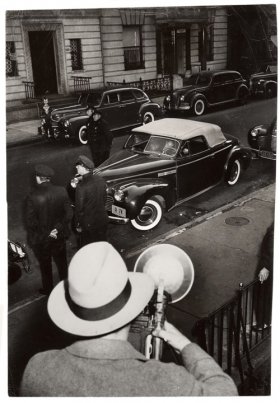Weegee
dal 13/12/2007 al 4/3/2008
Segnalato da
13/12/2007
Weegee
Foam Photography Museum, Amsterdam
His uncompromising and unprettified photographs have an immediate, almost violent impact. They show crimes and accidents in the New York of the 1930s and 1940s, but also document life and events on the streets of the city. All 231 black-and-white photographs are vintage prints from the collection of Hendrik A. Berinson, compiled over a period of more than 20 years.

Foam_Fotografiemuseum Amsterdam presents an exhibition of work by the legendary photographer Weegee, regarded as the prototypical modern photojournalist and one of the most important photographers of the 20th century. His uncompromising and unprettified photographs have an immediate, almost violent impact. They show crimes and accidents in the New York of the 1930s and 1940s, but also document life and events on the streets of the city. All 231 black-and-white photographs are vintage prints from the collection of Hendrik A. Berinson, compiled over a period of more than 20 years. This is the single most important and extensive collection of Weegee’s work made up exclusively of original prints. The exhibition contains many of Weegee’s most famous images and photographs, many of which have never been reproduced.
Weegee was born Usher Fellig in Zloczew, near Lemberg, in 1899. Lemberg was at the time capital of Galicia, but is now no more than a Ukrainian provincial town. In 1906 his parents decided to emigrate to the United States. His father left first, and sent for his family in 1910. At immigration, Usher’s first name was changed to Arthur, which was to remain his official name until 1938, when he himself adopted the nickname Weegee.
Weegee’s famous and unmistakable photographic works were created between 1935 and 1947. He was often the first to take the pictures of a of a crime scene, a catastrophe, an arrest or a suicide. But he also photographed couples at the cinema, bathers at Coney Island beach and masked dancers at charity balls – a panorama of a society characterized by social opposites.
It is almost impossible to view Weegee’s work without being emotionally affected by them. His photographs are as unique as they are precise and highly direct, always enticing the viewer to become involved. The photos are so accessible and straightforward, characterized by the immediate proximity in which they are taken, the head-on angle and the aggressive flash, that captions are not needed to understand their meaning. His intention is to freeze a precise moment on film, capturing the story as spontaneously as it happens.
Weegee produced all his photographs to sell to the daily papers. The art market and museums only came to recognize the artistic value of his images in the 1970s. He set new standards for photo reporting and created his own visual language and artistic style. This and his working methods, the composition and the reflection on the press of the day influenced such later photographers as Diane Arbus, Garry Winogrand and William Eggleston.
Foam_Fotografiemuseum Amsterdam
Keizersgracht 609 1017 DS Amsterdam
Open daily 10.00-18.00, Thurs/Fri 10.00-21.00.
Tickets: euro 7



